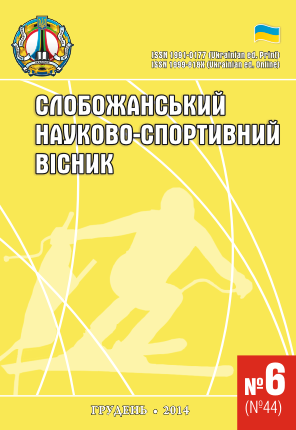Organizational methods conditions of formation of motivation at corresponding pedagogical skills to professional-applied physical training
DOI:
https://doi.org/10.15391/snsv.2014-6.023Keywords:
students, teaching profession, empathy, professionally applied physical fitness, motivationAbstract
Purpose: to develop organizational and methodological conditions of formation and motivation of students to determine their effectiveness. Materials and Methods: the study was conducted by third year student of the correspondence department of the Faculty of Primary Education (53 people). We used the following methods: survey of theoretical knowledge, motor tests, evaluation methods of physical health (G. Apanasenko), psychological methods of training motivation (T. Ilyina), motivation to succeed (T. Elers), rapid diagnosis empathy (I. Yusupova), methods of mathematical statistics. Results: the factors that affect the state of professionally-applied physical fitness of students of the correspondence department of the Faculty of Primary Education. Conclusions: the proposed organizational and methodological conditions activation independent of external students is the basis for providing in centives for self-study educational materials, improving theoretical knowledge in the field of physical education, increased motor activity through various forms of regular exercise.
References
Derzhavnі vimogi do navchalnikh program z fіzichnogo vikhovannya v sistemі osvіti [State requirements for training programs in physical education in education], Access mode : http://www.uazakon.com/document71/inx71134.htm. (ukr)
Vilenskiy M. Ya., Solovyev G. M. Fizicheskaya kultura: vospitaniye, obrazovaniye, trenirovka [Physical education: education, education and training], 2001, vol. 3, pp. 2–7. (rus)
lchenko F. І Teoretiko-metodichnі problemi vikhovannya dіtey ta uchnіvskoі molodі [Theoretical and methodological problems of education of children and youth], 2011, vol. 15, book 1, pp. 431–438. (ukr)
Kovalіv O. V. Vіsnik Chernіgіvskogo derzhavnogo pedagogіchnogo unіversitetu іmenі T. G. Shevchenka [Journal of Chernihiv State Pedagogical University named after Taras Shevchenko], Vol. 102, T. 2, Chernіgіv, 2012, p. 373. (ukr)
Marchenko O. Yu. Formuvannya tsіnnіsnikh kategorіy osobistoі fіzichnoі kulturi u studentskoі molodі : avtoref. kand. nauk z fіz. vikh. і sportu [Formation of value categories of personal physical training in university students : PdD thesis], Dnіpropetrovsk, 2010, 20 p. (ukr)
Raеvskiy R. T., Khalaydzhі S. V. Profesіyno-prikladna fіzichna pіdgotovka studentіv yenergetichnikh spetsіalnostey [Professionally applied physical energy majors prepare students], Odesa, 2006, 132 p. (ukr)
Raеvskiy R. T., Tretyakov M. O., Kanіshevskiy S. M. Fіzichne vikhovannya: Navchalna programma dlya vishchikh navchalnikh zakladіv Ukraіni III–IV rіvnіv akreditatsіі [Physical Education: Training program for higher education in Ukraine III-IV accreditation levels], Kyiv, 2003, 44 p. (ukr)
Shiyan B. M. Teoretiko-metodichnі osnovi pіdgotovki vchitelіv fіzichnogo vikhovannya v pedagogіchnikh navchalnikh zakladakh : avtoref. dis. dokt. ped. nauk [Theoretical and methodological bases for training teachers of physical education in teacher training institutions : Doct. of. Sci. Thesis], Kyiv, 1997, 50 p. (ukr)
IrhinVladimir, Irhina Irina. Genesisofhealth – orientedphysical cultureat schools of Russia (theendofthe XIX century – the 80s oftheXIX century) / VladimirIrhin, IrinaIrhina // Sport Logia/ 2011,vol/7 (2), pp. 169–176.
Mesica Vanes. Identifying Country-Specific Cultures of Physics Education: A differentialitem function in approach / Mesica Vanes. International Journal of Science Education. 2012, vol. 34 (16), pp. 2483–2500.
Trninic M. Development. Management Model of elite athletes in team sports games / M. Trninic, S. Trninic, V.Papic // Collegium Antropologicum. – 2009, vol. 33 (2), pp. 363–372.
Downloads
Published
How to Cite
Issue
Section
License
Copyright (c) 2014 (Victorya Tsybul’ska) Цибульська Вікторія Вікторівна

This work is licensed under a Creative Commons Attribution 4.0 International License.
Our publications make use of copyright CREATIVE COMMONS open access journals.
Authors published in this journal agree to the following terms:
1 The authors reserve the right of authorship of the work and pass the journal right of first publication of this work are licensed under the Creative Commons Attribution License, which allows others to freely distribute the published work with reference to the authors of the original work and the first publication of this magazine.
2 The authors have the right to enter into separate agreements for additional non-exclusive distribution of work in the form in which it was published the magazine (such as work place electronic repository institution or publish as part of the monograph), provided that the reference to the first publication of this magazine.

 Attention, authors!
Attention, authors!


